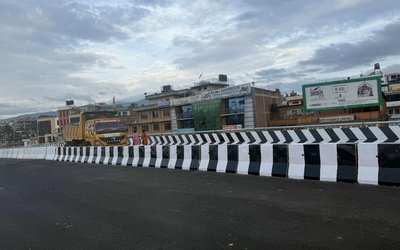More on News






Nirmala Pariyar (name changed), 30, a woman representing the dalit community, returned last year generating about one and a half million rupees in jobs abroad. With the money, she started growing vegetables in her home district of Dhading.
Mother of two, Pariyar was lucky enough to return with such a huge amount of money. Along with the money, she brought a painful story with her. Her main complaint is that there is hardly anyone who recognizes women’s contributions and treats them equally with males.
Following denial to her to leave the country through Tribhuvan International Airport, she was compelled to choose a riskier route. She left for Lebanon from Mumbai Airport.
“There is no respect for women in Nepal. There is injustice for women who want to go to work abroad. Whether you are in the International Airport or in the border point, you have to reply to several senseless questions to the police, the posts of anti-trafficking NGOs and others as if you are going to land in a brothel,” said Pariyar. “Of course, there are incidents of landing illiterate women in brothels but all are not going to go that way. But generally, respect for women is lacking.”
Some women like Pariyar who go for foreign employment through other ways have returned empty-handed with many traumas of rape or sexual harassment. Many women who go for foreign employment through the legal ways have good stories to tell.
Because of improper or a lack of pre-departure orientation and skills training, some women have also been the target of human trafficking.
Although there are places created to train women, they rarely register for the training because they work abroad illegally. There are 53 training centers clustered in Kathmandu, but they are inaccessible to women in remote districts, who are the most likely to go for foreign employment.
“Women migrant workers have been on the rise in Nepal in recent years. It is unfortunate that this hasn’t increased their socio-economic standing because of a lack of rights at home,” said Saru Joshi, regional program coordinator of U.N. Women-Nepal.
“Recently released Nepal Living Standard Report III shows that women have made a greater contribution in the remittances in Nepal. It is unfortunate that it is yet to be properly recognized,” said Joshi in an interaction program recently.
“The government has created policies to ensure women have equal rights with men, but that Nepal is still a patriarchal country, cultural and social traditions have limited the policies’ implementation,” said Joshi.
According to government data, Nepali migrant workers remitted over 3 trillion rupees in 2010/011. Out of total Nepal’s migrant workers, Nepalese women consist of 15 percent. Although globally women migrant workers occupy 50 percent, Nepalese women’s percentage is insignificant.
“Therefore, the government should have concrete policies to govern the rights of women,” Joshi says.
Despair pervades when many women land in desperate and troubled situation for having left for foreign employment without proper training and knowledge about the country’s legal system.
Saraswasti (name changed) has a story to tell as she was sent back to the country from Saudi Arab when the owner of the house attempted to rape her. “If this had happened to me here, I could have gone to the police, but in his country, I couldn’t do so. He imprisoned me in his house and kept on raping me.”
Saraswati, who now earns a living as a tailor to support her son, says she doesn’t recommend any woman to go abroad for foreign employment.
“I went there to become financially independent,” she says. “But for women, foreign employment isn’t what you think it to be. They treat us like animals, not humans.”
She says she encourages women to find jobs in their own countries instead.
Many Nepali women who leave the country for work return with stories of exploitation. As a result, some recommend working at home instead, insisting that it’s more feasible than women realize. Others report having positive experiences with foreign employment, as long as women get the right job and know the language and laws before departing. The government banned women from working in the Gulf for safety reasons until last year and has established training centers to prepare migrant workers, but some say more needs to be done. Others say the answer is to strengthen women’s rights at home.
According to Pourakhi, a local NGO for women migrant workers, there are 70,000 Nepali women working in Saudi Arabia, 30,000 in Kuwait, 14,000 in Israel and 15,000 in Lebanon. Of all the women, 80 percent end up as domestic helpers and 90 percent are without proper documentation.
Meena Shrestha, 29, of Biratnagar, recently returned from working in Dubai, where she says she had a positive experience. She says she is aware of several women being sexually exploited in foreign countries, but that women can make themselves less vulnerable by knowing the language, the laws and their rights in the foreign country. She also says some jobs are more prone to sexual exploitation than others.
Manju Gurung of Pourakhi said that as of 2011, more than 100,000 Nepali women were working abroad in the Middle East without proper documentation.






